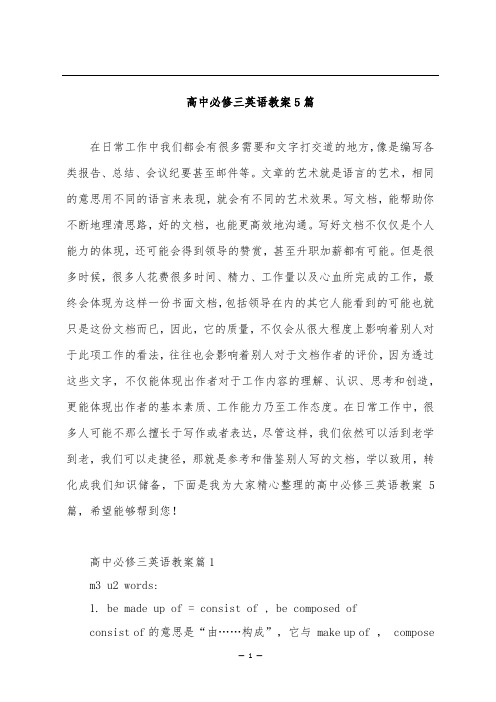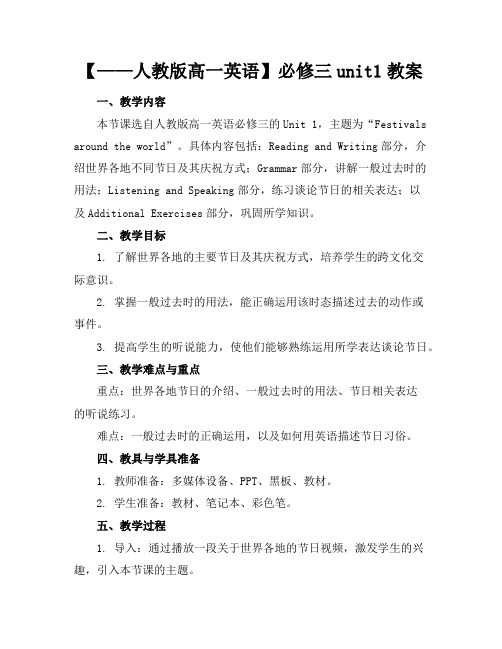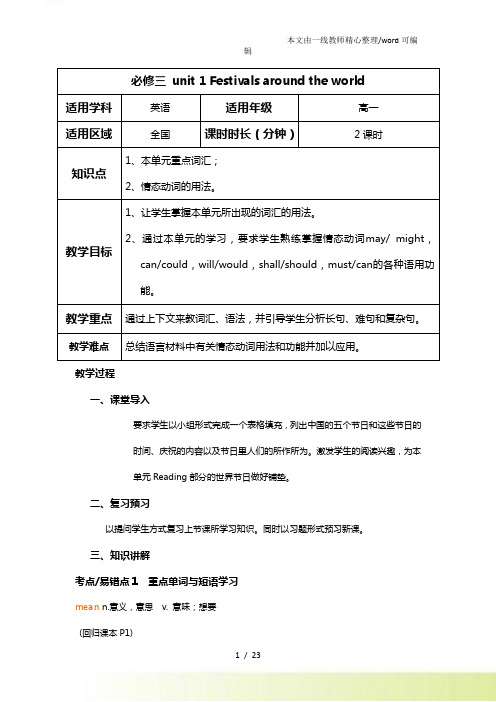高一英语必修三教案
高一英语必修三的教案

高一英语必修三的教案教学目标1.熟练掌握必修三单词、短语、语法和句型,能够运用到日常生活中。
2.提高学生的听、说、读、写的语言水平,能够听懂英语广播、电视和与外籍人士的交流。
3.培养学生的综合语言运用能力,使其能够在实践中熟练有效地运用英语。
4.培养学生良好的英语学习习惯和自主学习能力,为下一步的英语学习打下坚实的基础。
教学内容Unit 1 Education词汇1.academic2.boarding school3.private school4.state school5.vocational6.equivalent7.optional8.tutorial语法1.形容词比较级和最高级2.介词的用法3.宾语从句和宾语不定式阅读与写作1.根据所学内容完成阅读理解练习2.运用所学语法、词汇和短语,完成作文练习Unit 2 Healthy eating词汇1.nutritious2.balancedanic4.supplement5.vegetarian6.protein7.fiber8.mineral语法1.不定式和动名词的用法2.祈使句和感叹句阅读与写作1.根据所学内容完成阅读理解练习2.运用所学语法、词汇和短语,就“健康饮食”展开讨论并完成作文Unit 3 Bonds of friendship词汇1.bond2.mutual3.sincere4.acquntancepanion6.isolated7.confide8.sympathy语法1.以及从句和定语从句2.间接引语和直接引语的转换阅读与写作1.根据所学内容完成阅读理解练习2.运用所学语法、词汇和短语,就“友谊”主题展开讨论并完成作文Unit 4 Conflicts词汇1.confront2.escalatepromiseplex5.inevitable6.reconcile7.confrontational8.hostility语法1.名词性从句2.疑问句和陈述句的转换阅读与写作1.根据所学内容完成阅读理解练习2.运用所学语法、词汇和短语,就“冲突和解决冲突”展开讨论并完成作文教学步骤1.激发学生兴趣,设计多样的课堂教学活动。
高中必修三英语教案5篇

高中必修三英语教案5篇在日常工作中我们都会有很多需要和文字打交道的地方,像是编写各类报告、总结、会议纪要甚至邮件等。
文章的艺术就是语言的艺术,相同的意思用不同的语言来表现,就会有不同的艺术效果。
写文档,能帮助你不断地理清思路,好的文档,也能更高效地沟通。
写好文档不仅仅是个人能力的体现,还可能会得到领导的赞赏,甚至升职加薪都有可能。
但是很多时候,很多人花费很多时间、精力、工作量以及心血所完成的工作,最终会体现为这样一份书面文档,包括领导在内的其它人能看到的可能也就只是这份文档而已,因此,它的质量,不仅会从很大程度上影响着别人对于此项工作的看法,往往也会影响着别人对于文档作者的评价,因为透过这些文字,不仅能体现出作者对于工作内容的理解、认识、思考和创造,更能体现出作者的基本素质、工作能力乃至工作态度。
在日常工作中,很多人可能不那么擅长于写作或者表达,尽管这样,我们依然可以活到老学到老,我们可以走捷径,那就是参考和借鉴别人写的文档,学以致用,转化成我们知识储备,下面是我为大家精心整理的高中必修三英语教案5篇,希望能够帮到您!高中必修三英语教案篇1m3 u2 words:1. be made up of = consist of , be composed ofconsist of的意思是“由……构成”,它与 make up of , composeof 的区别在于:consist of不可用被动语态,而make up of和 compose of 可以用被动语态。
例如:1) the house consists of 6 rooms.2) the medical team is made up of three doctors and a nurse. 3) the book is composed of 25 units.2.occupy occupation n.占据、职业1. occupy意为“take up or fill (time, space, sb’s mind, etc)”“占据,充满(时间,空间,某人的头脑等)”。
高一英语必修3教案全部

Unit 1 Festivals around the worldIII. 教材分析与教材重组1. 教材分析本单元以节日为话题,介绍古今中外节日的种类、由来、意义以及人们的活动和习俗,旨在通过本单元的学习使学生不但了解我国的节日,而且对外国的节日也有所了解,进而拓展社会文化背景、增加跨国文化知识;使学生复习和巩固运用请求和感谢的表达法,掌握情态动词的用法;并尝试根据阅读的文章写一个不同的结局,能表达自己的观点和想法。
1.1 Warming Up 旨在通过表格引导学生讨论并列举出五个我国节日的日期、庆祝内容和民俗。
可以刚刚过去的春节为话题导入对节日的讨论;使他们由自己的经历谈起,扩展到别的节日以及外国的重要节日,激发学生的兴趣,激活他们关于节日的背景知识,为本单元的学习做准备。
1.2 Pre-reading是Reading 的热身活动。
主要通过两个问题引导学生思考并讨论自己最喜欢的节日及欢度方式,进而了解学生对节日的认识,以便为阅读作好铺垫。
1.3 Reading 的五篇小短文分别介绍古代节日、亡灵节、纪念名人的节日、丰收节、春天的节日等,使学生了解各种节日的由来及其存在的意义。
此部分载有Festivals的重要信息,还呈现了大量的词汇和主要的语法---情态动词的用法。
处理时应作为重点、整体处理,通过上下文来教词汇、语法,并引导学生分析长句、难句和复杂句。
1.4 Comprehending是考察对阅读内容的进一步理解。
练习一:六个问题让学生对文章内容有浅层理解并考察课文细节,但又不能仅仅拘泥于课文,要引导学生理解课文内容的基础上联系现实生活。
练习二:要求学生讨论哪些节日是最重要的,哪些是最有趣的,以表格的形式检查学生对所读节日的理解,并训练他们举一反三的归纳和推理能力。
练习三:要求学生找出各种节日共有的三件事,然后讨论为什么这些事对各地的人们都很重要。
这就要求学生不仅要温习文章内容而且要结合实际,阐述自己的想法,挖掘学生的思维能力和语言表达能力。
高一英语必修三的教案

高一英语必修三的教案教学目标1.通过本单元学习,学生将能够掌握必要的词汇,包括与环境保护相关的词汇,比如“pollution,”“emission,” 和“conservation.”2.学生将学会采用英语进行环保主题的讨论,并学会提出自己的看法和想法。
3.学生将能够理解环保主题的新闻报道,并能胜任完成阅读理解测试的挑战。
讲课步骤前言在教学本单元之前,老师应先了解学生在环保方面的观念和知识积累,并在课程中重点关注环保相关的话题,如环境保护组织,能源和环境污染等内容。
第一步:词汇学习1.环保相关的单词和词组以及其含义–pollution: 污染–emission: 排放–conservation: 保护–sustnable: 可持续的–renewable: 可再生的2.常见句型–It is important/necessary to protect the environment.——保护环境很重要/必要。
–We should do our best to reducepollution.——我们应该尽力减少污染。
–Renewable energy should be developed widely.——可再生能源应该广泛发展。
第二步:听力训练教师播放关于“环保”的录音,要求学生听清答案,了解短文风格并掌握新单词。
播放结束后,老师可以进行问答,了解学生对于短文的内容、理解程度以及是否遇到难点。
第三步:课文理解1.教师进行课文阅读和解析,了解文章主题,情绪和短文主要分成部分。
2.对于生字或专业词汇,教师进行相关解释,帮助学生理解短文内容。
3.教师可以进行放映相关短片或介绍有关环保组织的PPT,帮助学生理解短文。
第四步:阅读理解教师出示阅读理解测试卷,学生阅读完毕后进行答题,老师可以进行现场解析并详细评分,让学生理解并知道自己的不足之处。
课后作业1.让学生回顾教学内容并总结重要知识点,形成笔记并逐一加以理解,夯实基础。
【——人教版高一英语】必修三unit1教案

【——人教版高一英语】必修三unit1教案一、教学内容本节课选自人教版高一英语必修三的Unit 1,主题为“Festivals around the world”。
具体内容包括:Reading and Writing部分,介绍世界各地不同节日及其庆祝方式;Grammar部分,讲解一般过去时的用法;Listening and Speaking部分,练习谈论节日的相关表达;以及Additional Exercises部分,巩固所学知识。
二、教学目标1. 了解世界各地的主要节日及其庆祝方式,培养学生的跨文化交际意识。
2. 掌握一般过去时的用法,能正确运用该时态描述过去的动作或事件。
3. 提高学生的听说能力,使他们能够熟练运用所学表达谈论节日。
三、教学难点与重点重点:世界各地节日的介绍、一般过去时的用法、节日相关表达的听说练习。
难点:一般过去时的正确运用,以及如何用英语描述节日习俗。
四、教具与学具准备1. 教师准备:多媒体设备、PPT、黑板、教材。
2. 学生准备:教材、笔记本、彩色笔。
五、教学过程1. 导入:通过播放一段关于世界各地的节日视频,激发学生的兴趣,引入本节课的主题。
2. 阅读与写作:a. 让学生快速浏览课文,了解世界各地的主要节日。
c. 指导学生进行写作练习,用一般过去时描述自己最喜欢的节日。
3. 语法讲解:通过例句和练习,让学生掌握一般过去时的用法。
4. 听力与口语:a. 播放听力材料,让学生回答关于节日的问题。
b. 学生两人一组,进行节日话题的口语练习。
5. 巩固练习:完成Additional Exercises部分,检查学生对本节课知识的掌握。
六、板书设计1. Festivals around the world2. 内容:a. 世界各地节日及庆祝方式b. 一般过去时的用法c. 节日相关表达七、作业设计1. 作业题目:a. 根据课文内容,用一般过去时描述一个你了解的节日。
b. 收集更多关于节日的资料,与同学分享。
【人教高一英语】必修三 unit 1 教案

必修三unit 1 Festivals around the world 适用学科英语适用年级高一适用区域全国课时时长(分钟)2课时知识点1、本单元重点词汇;2、情态动词的用法。
教学目标1、让学生掌握本单元所出现的词汇的用法。
2、通过本单元的学习,要求学生熟练掌握情态动词may/ might,can/could,will/would,shall/should,must/can的各种语用功能。
教学重点通过上下文来教词汇、语法,并引导学生分析长句、难句和复杂句。
教学难点总结语言材料中有关情态动词用法和功能并加以应用。
教学过程一、课堂导入要求学生以小组形式完成一个表格填充,列出中国的五个节日和这些节日的时间、庆祝的内容以及节日里人们的所作所为。
激发学生的阅读兴趣,为本单元Reading部分的世界节日做好铺垫。
二、复习预习以提问学生方式复习上节课所学习知识。
同时以习题形式预习新课。
三、知识讲解考点/易错点1 重点单词与短语学习mean n.意义,意思v. 意味;想要(回归课本P1)Festivals are meant to celebrate important times of year.[归纳拓展]mean to do 打算做某事be meant to do 被要求做…mean doing 意味着….eg. I never meant him to work for us.Passing the entrance examination means being admitted into college.take place发生(回归课本P1)Discuss when they take place, what they celebrate and what people do at that time. [归纳拓展] take place/happen/occur/break out/come about(1)take place 其“发生”是按意图或计划进行,无偶然性,无被动语态。
人教版英语必修三教案
人教版英语必修三教案【篇一:人教版英语必修3全套教案】人教版英语必修3 unit1-5 教案unit 1 festivals around the worldteaching aims and demands1.topic: 1festivals2 how festivals begin3how to celebrate festivals2.function: 1requesteg: could you please…?could i have …?i look forward to doing…2thankseg: it?s a pleasure. /don?t mention it.it?s very kind of you to…i?d love to …thank you very much./thanks a lot.you are most welcome.3.vocabulary:4.grammar: 情态动词的用法jin can speak english well. (ability)coul d you please show me the way to …? (request)may we see the awards for the team? (permission)she might give you … (possibility)the whole family will come for dinner. (promise)often he would dress up like a rich man. (pass habit)we would be there with our friends. (promise)ii.key pointsperiod 1 warming up and fast reading1.greetings2.warming upstep 1 discussing the following questionsa.how was your holiday/spring festival?b.did you go traveling?c.how much pocket money did you get?step 2 talking1). name some festivalsspring festival dragon boat festival lantam festival mid-autumn festivalarmy day may day teachers? daynew year national day mother?s daychildren?s day father?s daychristmas day halloween carnivaleaster valentine day oben2).ss work in groups of four and list five chinese festivals and siscuss when they take place , what they celevrate and one thing that people do at that time. then fill in the blanks.festivals time of year/date celebrate for things to domid-autumn dayspring festivaldragon boat daytomb sweeping daylantern festival3.pre-reading1) what?s your favourite holiday of the year? why?2) what festivals or celebration do you enjoy in your city or town? do you like spending festivals with your family or with friends? what part of a festival do you like best—the music, the things to see, the visits or the food?4. fast reading and find the answers to the following questions.a.what did ancient festivals celebrate?b.what are festivals of the dead for ?c.why are autumn festivals happy events ? three things people do at spring festival ?period 2-3 intensive reading1.read the passage paragraph by paragraph and find the main ideas of each paragraphparagraph 1: all kinds of celebration in ancient time.paragraph 2: the purpose to honour the dead and three examplesfestivals time things people doobenday of the deadhalloweenparagraph 3: the reasons why we honour peoplefestivals who does it celebrate ?dragon boat festivalsclumbus dayindian national festivalparagraph 4: autumn festivals are happy eventsparagraph 5: how people celebrate in spring festivals2.language pointsa.they would starve if food was difficult to find…starve 〔v.〕饿死;挨饿eg. millions of people starved to death during the war.starve for sth 渴望?eg. the homeless children starve for love.starvation (n.) 饿死eg. die of starvationstarvation wages 不够维持基本生活的工资b.the most ancient festivals would celebrate the end of the cold weather, planting in spring and harvest in autumn.celebrate (vt./vi.) 庆祝,赞颂,赞美,举行〔仪式〕eg.we celebrate the new year with a party.their courage was celebrated in all the newspaper.celebrated (adj.) = famous 著名的,著名的c. …because they thought these festivals would bring a yearof plenty.days/years/?of plenty :富裕〔尤指事物和钱〕的日子,年月,生活等。
高一英语必修3人教版优秀教案
高一英语必修3人教版优秀教案教案标题:高一英语必修3人教版优秀教案一、教案概述本教案旨在针对高一学生学习英语必修3教材内容设计一份优秀教案,帮助学生提高英语听说读写的能力,培养他们的整体语言运用能力和跨文化交际能力。
二、教学目标1. 知识目标:学生能理解并掌握英语必修3教材中所涉及的词汇、语法、听力、阅读和写作技能。
2. 能力目标:学生能运用所学知识进行听说读写训练,提高其英语综合运用能力。
3. 情感目标:培养学生积极参与课堂活动的态度,增强他们学习英语的兴趣和自信心。
三、教学重难点1. 教学重点:英语必修3教材中重要词汇和语法的掌握,听力和阅读技巧的训练,以及写作能力的提高。
2. 教学难点:帮助学生通过设计的教学活动培养他们的英语跨文化交际能力。
四、教学内容与教学环节1. 教学内容:Unit 1 FriendshipUnit 2 English around the WorldUnit 3 Travel journalUnit 4 Astronomy: the Science of the StarsUnit 5 Nelson Mandela—a Modern HeroUnit 6 The Olympic GamesUnit 7 World populationUnit 8 Comic strips and Lesson 1 Green Spaces in Cities2. 教学环节:a. 导入活动:用图片和问题引导学生对话,调动学生的英语学习积极性和兴趣。
b. 新课呈现:通过多媒体或PPT展示新课内容,引发学生对新知识的探索和思考。
c. 听说读写训练:运用多种活动形式,如听力填空、语音模仿、朗读、讨论、小组合作等,培养学生听说读写能力。
d. 课堂练习与巩固:通过课堂练习测试学生对知识掌握的程度,并及时给予反馈和帮助。
e. 跨文化交际训练:通过角色扮演、对话演绎、文化分享等活动,培养学生的跨文化交际能力。
必修三英语教案5篇
必修三英语教案5篇最新必修三英语教案5篇英语教案对于教师提供了有组织、有针对性的教学指导,帮助教师高效地进行课堂教学,便于教学反思和调整,并促进教师之间的交流和分享。
下面给大家分享必修三英语的教案,欢迎阅读!必修三英语的教案(篇1)知识目标:复习两个阅读技能——scanning, skimming;学习本单元的部分生词。
本事目标:能构成文章的图式,在图式的帮忙下自主地复述本课的主要资料,在此过程中实现生词的重现。
情感目标:学生在教师的启发下,经过师生互动和生生互动,进一步探究知识。
在这一过程中,学生能够不断地实现互相教育和自我教育,并能寻求自我发展;学生能明白计划的重要性,并能收获一些与之相关的谚语。
教学重难点构成文章的`图式,并在图式的帮忙下复述文章的主要资料。
教学工具课件教学过程StepsTeacher’s activityStudents’ activityAimsStep 1Show and tell the students the learning goals for them and make possible explanationsStudents listen to the teacher and have an idea of what they are going to learn in this class。
To make the students know what they are to learn in this classStep 21)、Show some pictures with beautiful scenery2) Ask the students two questions:Are they attractiveWhere do you want to travel –I dream about traveling…1)Students appreciate those pictures2) Students answer teacher’s questions and practice the sentence pattern “I dream about traveling into…”1) To arouse students’ interest2) To practice a sentence patternStep 31) Show the title of the reading passage2) Ask the students whether this passage is about the whole process of the journey。
高一英语必修三优秀教案
高一英语必修三优秀教案教案标题:Using Technology to Enhance English Language Learning 教案概述:本教案旨在通过利用技术手段,提升高一英语必修三(Using Language)的教学效果。
本教案以话题“What is a global language?”为中心,通过使用多媒体工具和在线资源,激发学生的英语学习兴趣,提高学生的听、说、读、写能力以及跨文化交流能力。
教学目标:1. 听说读写能力:通过观看短片、听力练习和阅读材料,学生能够加深对全球语言的理解,提高英语的听说读写能力。
2. 跨文化交流能力:通过小组合作活动和网络资源的使用,学生能够增进对世界不同文化的了解,提高跨文化交流能力。
3. 技术应用能力:学生能够熟练使用技术工具(如电脑、互联网资源等)进行信息搜索和处理,提高自主学习和研究的能力。
教学步骤:步骤一:引入话题1. 使用一段有关全球语言的短片或PPT展示,激发学生对话题的兴趣。
2. 提问学生:“What is a global language?”和“Wh at role does English play as a global language?”以引导学生思考。
步骤二:听力理解1. 学生观看一个有关全球语言的短片,并回答相关问题。
2. 教师指导学生进行听力训练,使用在线听力资源或录音材料。
步骤三:阅读与讨论1. 学生阅读一篇关于全球语言的文章,并利用词典查找生词。
2. 学生分组讨论文章中的观点,就全球语言的利与弊进行辩论。
步骤四:跨文化交流1. 学生分成小组,每个小组代表一个国家,通过网络资源,收集和分享与本国语言和文化相关的信息。
2. 小组成员互相介绍各自国家的语言特点和文化传统,并就跨文化交流中可能遇到的问题进行讨论。
步骤五:写作训练1. 学生根据所学内容,撰写一篇关于全球语言的短文。
2. 教师针对学生的写作进行评价,并提供书面反馈。
- 1、下载文档前请自行甄别文档内容的完整性,平台不提供额外的编辑、内容补充、找答案等附加服务。
- 2、"仅部分预览"的文档,不可在线预览部分如存在完整性等问题,可反馈申请退款(可完整预览的文档不适用该条件!)。
- 3、如文档侵犯您的权益,请联系客服反馈,我们会尽快为您处理(人工客服工作时间:9:00-18:30)。
高一英语必修三教案【篇一:新课标人教版高一英语必修3全英文全套教案】1. unit 1 festivals around the world2. teaching aims of this unittalk about festivals and celebrationstalk about the ways to express request and thankslearn to use modal verbswrite a similar story with a different ending3. sentence patterns:request:could/ would you please…?could i have…?could we look at…?i look forward to…may i see…?thanks:it?s very kind of you…thank you very much/ thanks a lot.i?d love to.it was a pleasure…don?t mention it.you are most welcome.4. modal verbs:may might, can could will would must canthe first period 1. teaching aims:could i have…?…?may i see…?we might take…teaching procedurest: everybody! welcome back to school! did you have a good time in your winter holidays?ss. yes. of course!t: when did you feel most happy and excited?ss: at the spring festival.t: who can tell us why? any volunteers?s1: because it is the most important festival in our country. s2: because i got a lot of lucky money from my parents.s3: because i needn?t study at festivals and there was a lot of delicious food to eat.how great.s4: because i met my cousins and friends who i hadn?t seen for a long time.t. very food! i am glad to hear that. today we will talk about festivals, which aremeant to celebrate important events. please think about some other festivals. can you name just a few?ss: new year, yuan xiao festival…:t: quite right. that?s called the lantern?s festival. how about some otherfestivals?ss: the army day, international labour?s day, national day, tomb sweepingfestival, dragon boat festival, mid-autumn day…t: you have done a good job, boys and girls! .step Ⅱwarming –uplike best---the music, the things to see, the visits or the food? step Ⅳassignment1. consolidation2. listening to the material again after class to be familiar with it.3. homework: collect as much information about festivals as possible.the second period readingteaching aims1.vocabulary: starve, starvation, plenty, satisfy ancestor lamps lead feast bone originin memory of dress up trick poet arrival national gain independencegather agricultural european custom awards watermelon handsomerooster admire look forward to religious as though have fun with daily2.to enable the students to know the earliest festivals with reasons for them and four different kinds of festivals that occur in most parts of the world3.to enable the students to master some english expressions and phrases festivals.4. teach the basic reading skills: skimming and scanning.5. try to compare and make conclusion s of different festivals. step Ⅰrevision1. greetings.2. review the new words of this part.3. check the students? homework---festivalsstep Ⅱreading1.scanning( four minutes later, with the whole class. show the suggested ( allow to read aloud and carefully this time to understand the main3.reading and discussiont: read the text a third time and then work impairs to do exercise 2 on page 3.( let the students have enough time to read the passage carefully and discuss the chart with their partners. encourage them to expand their answers according to their own experiences.)4.explanation(in this part try to help the students analyse the difficult, long and complex sentences and guess the meaning of the new words; ask them to deal with the language points in the context.)t: now i will discuss some important sentences and phrases in the passage.a. some festivals are held to honor the dead, or satisfy and please the ancestors,who could return either to help or to do harm.b. in memory ofc. the leader who helped gain india?s independence from britain.d. a season of agricultural work is over.e. the end of winter and to the coming of spring.f. be covered with pink snow.the suggested explanation:a. an attributive clause.dead or to make happy in case they might come back to do harm.b.(hoping)(defending)c. →energetic adj. ( full of or done with energy)look forward to ( to is a preposition here.)devote to, be/get used to, get down to , stick toe.g. i?m looking forward to hearing from you.step Ⅲ listeningt: now i will play the tape for you. you can just listen with your books closed or look at your books or read in a low voice together with the tape. it?s up to you. after listening, please write down three things that most festivals seem to have incommon.( comprehending ex.3 on page 3).the third period learning about languageteaching aims:1. let the students know the usage of modal verbs.2. enable the students to recognize the words and expressions in the reading passageaccording to what mean the same as them.step Ⅰ greeting and revision( ask some students to retell the text we learned .)stepⅡ. practicing the useful words and expressionst: as we know, there are two important kinds of and intransitive verbs. but many intransitive verbs structure on.the words given.s2: we are talking about verbs.s3: would you like to talk with me?step Ⅲ verbs form and try to explain their meanings. if you have anystepthe usage of modal verbs. i think it is not easy for you to master them, after class you should review them.homework1. practice of wbp42ex.1,2,3.2. please find out10 sentences with modal verbs, and try to get their meanings.the fourth period listening【篇二:人教版高中英语必修3全套教案】人教版英语必修3 unit1-5 全套教案unit 1 festivals around the worldteaching aims and demands1.topic: 1festivals2 how festivals begin3how to celebrate festivals2.function: 1requesteg: could you please…?could i have …?i look forward to doing…2thankseg: it?s a pleasure. /don?t mention it.it?s very kind of you to…i?d love to …thank you very much./thanks a lot.you are most welcome.3.vocabulary:4.grammar: 情态动词的用法jin can speak english well. (ability)could you please show me the way to …? (request)may we see the awards for the team? (permission)she might give you … (possibility)the whole family will come for dinner. (promise)often he would dress up like a rich man. (pass habit)we would be there with our friends. (promise)ii.key pointsperiod 1 warming up and fast reading1.greetings2.warming upstep 1 discussing the following questionsa.how was your holiday/spring festival?b.did you go traveling?c.how much pocket money did you get?step 2 talking1). name some festivalsspring festival dragon boat festival lantam festival mid-autumn festivalarmy day may day teachers? daynew year national day mother?s daychildren?s day father?s daychristmas day halloween carnivaleaster valentine day oben2).ss work in groups of four and list five chinese festivals and siscuss when they take place , whatthey celevrate and one thing that people do at that time. then fill in the blanks.festivals time of year/date celebrate for things to domid-autumn dayspring festivaldragon boat daytomb sweeping daylantern festival3.pre-reading1) what?s your favourite holiday of the year? why?2) what festivals or celebration do you enjoy in your city or town? do you like spending festivals with your family or with friends? what part of a festival do you like best—the music, the things to see, the visits or the food?4. fast reading and find the answers to the following questions.a.what did ancient festivals celebrate?b.what are festivals of the dead for ?c.why are autumn festivals happy events ? three things people do at spring festival ?教学反思:period 2-3 intensive reading1.read the passage paragraph by paragraph and find the main ideas of each paragraphparagraph 1: all kinds of celebration in ancient time.paragraph 2: the purpose to honour the dead and three examplesfestivals time things people doobenday of the deadhalloweenparagraph 3: the reasons why we honour peoplefestivals who does it celebrate ?dragon boat festivalsclumbus dayindian national festivalparagraph 4: autumn festivals are happy eventsparagraph 5: how people celebrate in spring festivals2.language pointsa.they would starve if food was difficult to find…starve (v.)饿死;挨饿eg. millions of people starved to death during the war.starve for sth 渴望?eg. the homeless children starve for love.starvation (n.) 饿死eg. die of starvationstarvation wages 不够维持基本生活的工资b.the most ancient festivals would celebrate the end of thecold weather, planting in spring and harvest in autumn.celebrate (vt./vi.) 庆祝,赞颂,赞美,举行(仪式)eg.we celebrate the new year with a party.their courage was celebrated in all the newspaper.celebrated (adj.) = famous 著名的,驰名的c. …because they thought these festivals would bring a yearof plenty.days/years/?of plenty :富裕(尤指事物和钱)的日子,年月,生活等。
